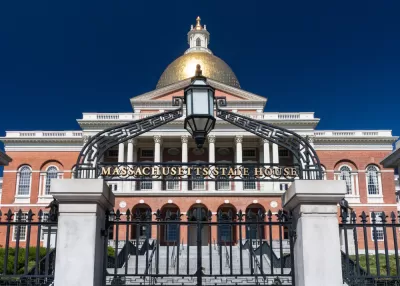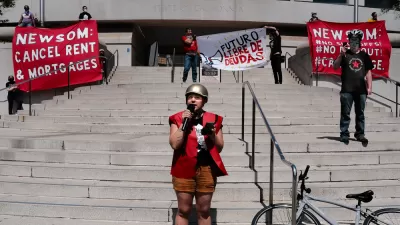The Massachusetts eviction moratorium—one of the strongest in the nation—expired, just in time for winter. How did this happen?

Lynn Shore Drive, one of the most well-trafficked oceanside roadways on Massachusetts’ North Shore, is also a land bridge between two worlds. Starting in Lynn, a working-class community with a large Latinx population—and some of the highest COVID-19 infection numbers in the state—the Shore Drive curves northeast toward the tony enclave of Swampscott. Here, Queen Anne Victorian houses sell for upward of $2 million. Gov. Charlie Baker lives here, near the center of town. And on a brisk October evening, as the sun paints the seascape with a pinkish glow, people are marching up the Shore Drive, heading straight toward Baker’s house.
Community organizers, tenants, small landlords, and a crowd of multigenerational locals have converged to stage a protest outside Baker’s residence. Some of them are beating drums, as passing drivers toot their horns. Others carry banners, flags, and bullhorns. But the most telling thing here is the black cardboard coffins that several marchers are carrying. Each coffin is emblazoned with words printed in white, in both English and Spanish. The first coffin pretty much says it all:
“Evictions = Death.”
Back in March, when Northeastern cities and metro areas like Greater Boston were crippled by the first wave of COVID-19, a couple of Massachusetts state representatives worked with local housing activists to create an eviction (and foreclosure) moratorium that Gov. Baker would sign in April. It was one of the most far-reaching moratoriums in the nation, delaying all court-based eviction proceedings; protecting tenants from late fees, negative credit reporting, and physical evictions; and extending protections to those at risk of foreclosure. As thousands of Massachusetts residents contracted and died from COVID-19, the state eviction moratorium allowed people to at least stay in their homes.
But the Massachusetts moratorium was never a long-term solution for the housing crisis posed by the COVID-19 pandemic. Tenants were left to accrue back rent debt. Small landlords risked falling behind on mortgage payments. Noting these sustainability problems at a press conference in September, Gov. Baker said, “The longer this thing goes on, the deeper the hole gets, not just for tenants, but also for landlords, especially small landlords who have in many cases run out of rope.” The implication was clear.
Baker let the moratorium lapse on its Oct. 17 expiration date.
The creators of the Massachusetts moratorium had planned for this. Joining forces with the same activist groups that shaped the eviction freeze, Reps. Mike Connolly and Kevin Honan spent early summer working on a legislative sequel. H.4878, aka the Housing Stability Act, would not only extend the moratorium to December 2021, but would include more economic support for small landlords and tenants. And yet, unlike the eviction ban, the Housing Stability Act wasn’t given a floor vote after being presented. Instead, it became stuck in committee for months, ignored by the Democratic house speaker, Robert DeLeo. Despite a groundswell of organizing from Massachusetts residents, the bill was not taken up by the legislature, and on Oct. 17, the Massachusetts eviction moratorium expired, just in time for winter, when coronaviruses spread more readily.
How did this happen?
The Act
If nothing else, Massachusetts’ initial eviction moratorium was a success story of what’s possible when the energies and perspectives of grassroots community organizers and state politicians merge organically, yielding policy. In March, just after the World Health Organization declared the pandemic ...
FULL STORY: Massachusetts Showed States How to Create an Eviction Ban. Now It’s Backpedaling

Planetizen Federal Action Tracker
A weekly monitor of how Trump’s orders and actions are impacting planners and planning in America.

Maui's Vacation Rental Debate Turns Ugly
Verbal attacks, misinformation campaigns and fistfights plague a high-stakes debate to convert thousands of vacation rentals into long-term housing.

San Francisco Suspends Traffic Calming Amidst Record Deaths
Citing “a challenging fiscal landscape,” the city will cease the program on the heels of 42 traffic deaths, including 24 pedestrians.

Defunct Pittsburgh Power Plant to Become Residential Tower
A decommissioned steam heat plant will be redeveloped into almost 100 affordable housing units.

Trump Prompts Restructuring of Transportation Research Board in “Unprecedented Overreach”
The TRB has eliminated more than half of its committees including those focused on climate, equity, and cities.

Amtrak Rolls Out New Orleans to Alabama “Mardi Gras” Train
The new service will operate morning and evening departures between Mobile and New Orleans.
Urban Design for Planners 1: Software Tools
This six-course series explores essential urban design concepts using open source software and equips planners with the tools they need to participate fully in the urban design process.
Planning for Universal Design
Learn the tools for implementing Universal Design in planning regulations.
Heyer Gruel & Associates PA
JM Goldson LLC
Custer County Colorado
City of Camden Redevelopment Agency
City of Astoria
Transportation Research & Education Center (TREC) at Portland State University
Jefferson Parish Government
Camden Redevelopment Agency
City of Claremont





























